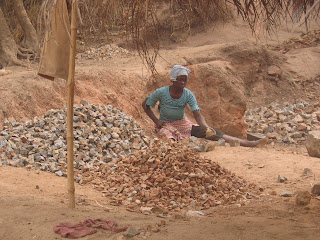The term Telemedicine is the delivery of medicine at a distance. The term is composed of the Greek word τελε (tele) meaning 'far', and medicine. Telemedicine may be as simple as two health professionals discussing a case over the telephone, or as complex as using satellite technology and video-conferencing equipment to conduct a real-time consultation between medical specialists in two different countries.
Major investments in this technology can help delivery high quality medical services in some of the most remote areas of the world. Telemedicine can also provide access to care where health care professionals are in high demand, but low supply. I see this as a real opportunity to improve health in poor and developing nations.
Here is an example:
A telemedicine project in Rwanda that will allow doctors to conduct their medical services via the Internet has been launched by the Rwanda Ministry of Health. The details regarding the significance of the telemedicine project in medical services were recently unveiled by the Minister of State for Health Dr Innocent Nyaruhirira. Dr. Nyaruhirira said that patients can access the telemedicine services at King Faisal, Kigali Central and Butare University Hospitals but more centers are to be opened across the country.
The development that has been underway since 2003, was delayed by the training of manpower who are to handle this new technology in medical services.
"The government has provided a useful tool to expand the quality of medical services regardless of geographical access. It is now the duty of all institutions and service providers to make use of facilities offered by online hi-tech device in order to make e-medicine efficient and sustainable" said the minister.
Telemedicine will allow the sharing of the limited resources available among health institutions to treat as many patients and teach more students as possible using with the few doctors and teachers available.
State Minister for Energy and Communication, Eng. Albert Butare urged the concerned parties to utilize telemedicine saying that "It should go beyond demonstration, and you extend it to patients in need."
Butare noted that the service could eventually transform the health sector. The Country Representative of the United Nations Development Programme (UNDP) to Rwanda, Moustapha Soumare noted that telehealth will help improve the quality of health services through teaching and linking Universities in Rwanda to others worldwide.
"That's why it is vital to create an environment where the world can follow online what is happening in Rwanda's health sector," he said promising UNDP commitment to support the telemedicine project.
In the presentation on how e-medicine works in his home country 'South Africa' Prof. Maurice Mars from the University of Kwazulu Natal pointed out the consideration of local and international legal clinical guidelines and standards in the use of e-medicine.
"It is crucial to consider local and international legal clinical guidelines which go hand in hand with human resource change management", Prof. Mars said, noting that South Africa is now collaborating with six African countries, including Rwanda to promote telehealth.
(Source: AllAfrica.com, March 4, 2007)
Read more at:
http://tie.telemed.org/news/







